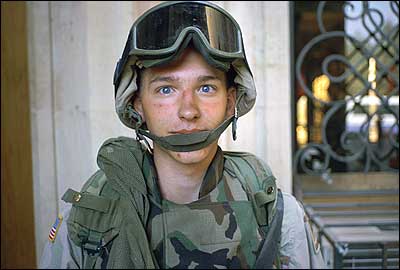
Watching Gunner Palace, I initially wondered whether the filmmakers, Michael Tucker (no relation) and Petra Epperlein, were like the people who used to spit on Vietnam veterans when they returned home. Their anger—in this case, about America’s invasion and subsequent “rebuilding” of Iraq—seemed gravely misplaced. Instead of criticizing the Bush-administration policies their film so clearly detests, Tucker and Epperlein train their cameras on the people involved in this engagement who have the least power. These are, of course, the soldiers, who are made to look, most of the time, like irresponsible fools.
What do we see? Brash soldiers, many not yet out of their teens, running rampant in the bombed-out remains of Uday Hussein’s Azimiya Palace. The 2/3 Field Artillery, known as “The Gunners,” spend their downtime swimming in the huge pool once owned by the deposed dictator’s son, golfing on his putting greens, and swilling Snapple while complaining about the lack of alcohol. At other times, they slam their Humvees into the gates of Iraqi citizens’ homes, barking out orders laced with obscenities, and then ridicule the quaking family members—so-called blacklisted Iraqis suspected of working with Hussein loyalists. We see U.S. soldiers making crude jokes about the barren country they’re stuck in. In a line that’s already the most-quoted one from the film, a soldier says to the camera—to us—“For y’all, this is just a show, but we live in this movie,” while another notes, “If you watch this, you’re going to go get your popcorn out of the microwave and talk about what I say, [but] you’ll forget me by the end.”
The result is a portrait of self-pitying rowdies. There’s no context in Gunner Palace, no distance that might make the soldiers’ behavior seem like what it is: the natural reaction of kids who happen to have guns, blowing off steam. Mostly male, many are poorly educated; they enlisted for lack of any other options in life. Now they’re just doing what they’re told to do. (There’s a movie to be made about the conditions in America that produced this segment of the population, but who’s going to be bold enough to make that?) As a result, Gunner Palace paints a picture of Ugly Americanism that does a major disservice to these luckless souls, many of them simultaneously brave, scared, and angry, not only at the declared enemy but also at the government that shipped them over to this place.
It becomes clear, as Gunner Palace proceeds, that the filmmakers don’t intend to exploit the soldiers (indeed, Tucker was once a reservist himself, his father, a Vietnam veteran), but the film is inept at conveying in what sense it’s on the soldiers’ side. Tucker, who narrates the film and seems to have shot most of it himself with a handheld camera over the course of 60 days spent in Baghdad, apparently believes that merely by letting his subjects spout off, he’s providing unfiltered realism.
But the film is sloppily edited—Tucker and Epperlein pick up and drop the tales of one soldier after another, shuffling scenes so that you have to scramble to remember some young fellow you’d just gotten a fix on a half-hour earlier. There’s an abrupt stop about an hour into the movie when Tucker goes home and trains the camera on his refrigerator, chatting tritely about the culture shock he experiences upon leaving Iraq, and about how glad he is to be safe again. But then we’re plunged right back into Iraq and more American shenanigans—the movie is a narrative mess.
All this wouldn’t matter so much if Gunner Palace weren’t being heralded in advance as a film that speaks truth to power, as though letting soldiers horse around for the camera were a searing indictment of our calamitous presence overseas. There are a lot of ways to make that argument (indeed, this past month’s Frontline documentary on the same subject, A Company of Soldiers, was a far more objective, cogent portrayal of our troops). By contrast, Gunner Palace too often makes the grunts look like mean slackers—precisely the opposite, one presumes, of what was intended.
Gunner Palace
Directed by
Michael Tucker and
Petra Epperlein.
Palm Pictures. R.